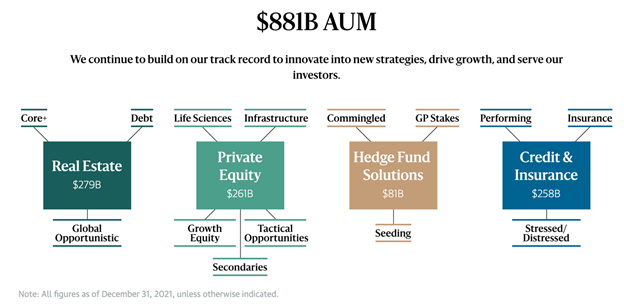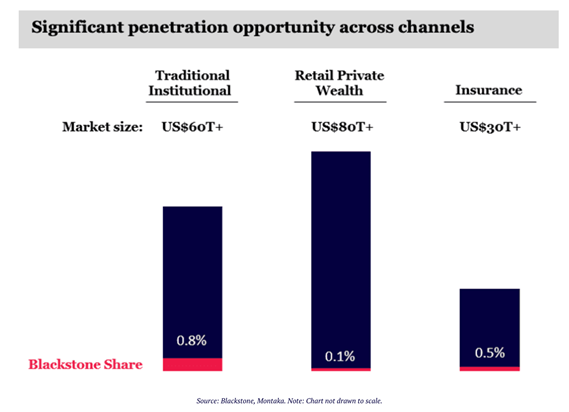Megatrend #1: Trillions of Dollars are Migrating to Alternative Assets.
Mega Brand: Blackstone (BX), the Biggest Beneficiary of this Megatrend
Key Points
- Thematic investors focus on megatrends and the brands that stand to benefit most.
- There is no bigger megatrend in financial services than the migration of assets to Alts.
- Blackstone, the Apple of the Private Equity Business, benefits most from this pivot.
“There is an undeniable secular pivot in asset management allocations …non-correlating assets are being added to retail and institutional portfolios and this is a multi-decade secular opportunity”

Thematic Investing
As you know, our team at Accuvest created the Dynamic Brands Strategy to invest in the global consumption primary thematic. Consumers and institutions spending >$40 trillion per year is the largest addressable market opportunity there is. Within the primary thematic, there are a few mega-trends that offer investors significant investment opportunities. There are not many global consumption-focused investors and there are even fewer dedicated mega-trends investors. We think that’s a big mistake and in the next few posts I’ll highlight a few of the multi-decade megatrends we see for investors. To be clear, a megatrend is a secular shift in a current industry or sector that will alter the landscape and usher in a massive opportunity for the leading brands serving the megatrend. The Dynamic Brands Strategy is very unique because the portfolio contains leading brands serving multiple megatrends within a general theme of global consumption.
Megatrend #1: The global pivot in asset allocations to non-correlating assets.
If you have not added any non-correlating and alternative assets to your portfolios, you will eventually. Why? Because they can add a significant amount of value, return and risk mitigation to the overall portfolio mix. The current traditional fixed income market offers more risk than ever because rates are more volatile and returns and yields have never been this unattractive. The partial shift away from traditional fixed income is early in its infancy and the fixed income market globally is greater than $120 trillion in size. Equities have always been volatile at times and with valuations higher than normal, future returns broadly could be less than average over time. Cash earns nothing and there is over $5 trillion sitting in cash being eaten away by inflation. Now compound that globally and you will uncover a solid opportunity for the alternative asset managers around the world.
Why will assets continue to shift? Let’s use one of the top Endowments as a guide. The Yale University portfolio holds about $43 billion in assets and is consistently a top performing Endowment in a very competitive peer group. Generally, if the smartest firms around the world are doing something consistently, we should all endeavor to emulate their approach. Here’s a few statements from the Yale Investments site:
Over the past 30 years, relative to the median endowment, Yale’s asset allocation has contributed 1.9% per annum of outperformance and Yale’s superior manager selection contributed an additional 2.4% per annum. The heavy allocation to non-traditional asset classes stems from their return potential and diversifying power. Alternative assets, by their very nature, tend to be less efficiently priced than traditional marketable securities, providing an opportunity to exploit market inefficiencies through active management.
If virtually every institutional investor, the most sophisticated ultra-high net worth investors, and major insurance companies have made the decisions to pivot away from the traditional, stocks, bonds, and cash approach to asset management, shouldn’t every investor consider it? This megatrend is in its infancy which is why Blackstone is raising assets and fee revenue at a scale I have never seen in my career.
We think this will continue for many decades and the assets these PE firms will raise over the next few decades will truly be astonishing. Just to drive home the total opportunity, below is a look at Blackstone’s market share in the U.S., and you’ll see there’s so much room for market share gains here:

New strategies are continuously being created and this will continue as the world evolves. When an attractive thematic presents itself, the savvy PE firms often create funds so investors can gain access to what they see as an opportunity. The more credibility a firm has, the more repeat business they get when they create new funds. This creates a wonderful network effect and a recurring revenue, cash flow machine. These factors often drive a stock to be a superior outperformer.
Generally, these PE firms employ some of the smartest, most connected professionals around the globe. These super-smart investors see future trends before most others and they have epic amounts of capital to capitalize on these opportunities. In fact, these firms benefit most during every period of turmoil because they are often the buyers of last resort and get the best prices for assets in distress. They capitalize most on the concept of “buying when there’s blood in the streets” even when some of the blood is their own. Because these firms currently have staggering amounts of dry powder at their disposal, they stand to benefit most, over the long-term, from every single worry that we all currently have. Example: are you worried about inflation? Why not invest in the areas of the global economy that benefit from rising rents and inflationary pressures. See the opportunity in climate change innovation? Invest in a fund that holds the significant beneficiaries of the global flows into climate change including being the private credit provider for these technologies. I cannot think of a better allocation today than turning some of your hard-earned money over to the smartest investors in the world. These firms now manage hundreds of billions in permanent capital. They benefit greatly from management fees, incentive fee’s, follow-on investment decisions, and the compounding of the assets via strong performance over time. I’m not sure most investors understand how powerful this flywheel is and I’m very confident most investors do not own the stocks of these great PE firms in their portfolios.
Blackstone: BX
This 36-year-old investment firm now manages $881 billion and has stated it is confident in hitting the $1 trillion mark in assets by year end. In our opinion, Blackstone has an unprecedented amount of runway for additional AUM growth given the sheer size of the global assets market. Case in point: there’s about $125 trillion invested in global equities and about $128 trillion in the global bond markets (sifma.org). Additionally, if Blackrock can manage >$7 trillion, Vanguard >$6 trillion, J.P. Morgan Asset Management >$2.5 trillion, Goldman Sachs >$2 trillion and they are largely focused on the markets that are net losers of assets to the alternatives market, why can’t the 800lb gorilla in the PE business, BX, eventually manage $2-$5+ trillion? This impressive brand is already generating significant amounts of management and advisory fee’s (FRE)
At $881 billion as of 12/31/21, the business has scaled to the point where recurring revenue and earnings predictability will be high and stable. Businesses with high recurring revenues and strong earnings stability are awarded with higher earnings multiples. Blackstone currently trades at a 15 p/e, yields 3.5%, is growing that dividend handily, has incredible profitability with unprecedented growth opportunities, and currently has over $135 billion in dry powder to take advantage of future dislocations and secular opportunities. The business is simply too cheap when compared to the secular opportunities they are benefitting from and the stability of the earnings that will be generated over time. That’s why BX is the top holding in the Dynamic Brands strategy. To be clear, BX is still a stock and given the nature of their business, it can be volatile at times when economic growth is in question. But when you see a secular growth opportunity like the migration of trillions in assets, you use volatility to your advantage, and you continue to accumulate shares like an opportunist should.
Blackstone stock has been a monster outperformer since the 2007 ipo.
Since June 2007, Blackstone stock generated a total return of ~950% as of 3/1/2022 versus the SandP 500 return of roughly 294%. That’s an annualized gain over the SandP 500 of just over 800bps per year that could have been generated if an investor simply understood the secular trends under way. That is why we focus on megatrends and own the Mega-Brands that dominate these industries.
We think the future is very bright for the industry and leaders like Blackstone.
Disclosure:
This information and the opinions expressed are those of the author as of the date of writing and are subject to change. Any research is based on the author’s proprietary research and analysis of global markets and investing. The information and/or analysis presented have been compiled or arrived at from sources believed to be reliable, however the author does not make any representation as their accuracy or completeness and does not accept liability for any loss arising from the use hereof. Some internally generated information may be considered theoretical in nature and is subject to inherent limitations associated therein. There are no material changes to the conditions, objectives or investment strategies of the model portfolios for the period portrayed. Any sectors or allocations referenced may or may not be represented in portfolios managed by the author, and do not represent all of the securities purchased, sold or recommended for client accounts. The reader should not assume that any investments in sectors and markets identified or described were or will be profitable. Investing entails risks, including possible loss of principal. The use of tools cannot guarantee performance. The charts depicted within this presentation are for illustrative purposes only and are not indicative of future performance. Past performance is no guarantee of future results.

